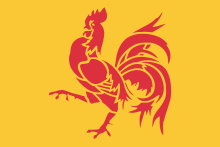Le Chant des Wallons
Le Chant des Wallons (The Song of the Walloons) is the anthem of Wallonia (Belgium).
| English: The Song of the Walloons | |
|---|---|
 | |
Regional anthem of | |
| Lyrics | Théophile Bovy, 1900 |
| Music | Louis Hillier, 1901 |
| Adopted | 1998 |
| Audio sample | |
| |
The original words, written in Walloon as Li Tchant des Walons by Théophile Bovy in 1900, were in 1901 set to music composed by Louis Hillier. Performed for the first time in the city of Liège, the song quickly spread to other parts of French-speaking Belgium and established itself like a "national" anthem for Wallonia.
When, on 15 July 1998, the Walloon Parliament approved a law defining the official symbols of the Walloon Region (a flag, anthem, and holiday), it was a French version of Li Tchant des Walons that was chosen. However, the lyrics adopted on that occasion are not a direct translation of the original: the number and order of verses differ, and they diverge significantly from the original Walloon text in places.
Lyrics
The original version in Walloon, here written in normalized orthography. (Normally only the first and third verses are sung.)
| Walloon lyrics | French lyrics | English translation |
|---|---|---|
I |
I |
I |
External links
- Parliament of Wallonia – The Parliament of Wallonia has a page featuring the history and lyrics of the anthem, as well as instrumental versions.
- Union Culturelle Wallonne – The UCW has a page about the anthem that includes a vocal version from the CD, "Li Tchant des Walons", by the Orchestre de Choeurs de l'Opera Royal de Wallonie, with Patrick Delcour as baritone.